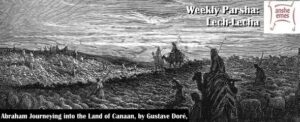Weekly Parsha: Lech Lecha
I. Summary
A. Journey to Canaan. Hashem told Avrom to leave Choran and proceed to another land which Hashem would show him. Avrom (along with his wife Sarai, nephew Lot, their possessions and the followers whom Avrom and Sarai had brought closer to Hashem and Torah) journeyed towards Canaan (Israel).
B. Hashem’s Promise. Avrom reached Canaan and continued on until he reached Shechem, where Hashem appeared in a vision and affirmed His promise to Avrom that Canaan would one day be his descendants’ domain. Avrom built an altar as thanksgiving.
C. Journey to Egypt. Because of a famine, Avrom and Sarai temporarily journeyed to Egypt. Avrom, fearful the Egyptians would kill him to take Sarai, told her to say that she was his sister. When they arrived in Egypt, Sarai’s beauty was greatly admired and she was taken into Pharaoh’s royal household. However, when Pharaoh and his household were smitten with mysterious illnesses, Pharaoh sensed that something was wrong. When Pharaoh learned that Sarai was really Avrom’s wife and that his taking Sarai had caused this punishment, he asked Avrom and his family to leave Egypt (even offering them riches to entice them to leave), which they did.
D. Return to Canaan. Avrom and Sarai returned to the city of Bethel in Canaan. As both Avrom and Lot had become extremely wealthy and had many flocks and herds, there wasn’t enough pasture land for both of their herds and quarrels erupted between their herdsmen. To avoid conflict, Avrom suggested that he and Lot separate, and offered Lot the first choice of which land to settle. Lot chose the fertile, well watered plain of Jordan, and pitched his tent until the infamous city of S’dome. Avrom settled near Chevron, and was again promised by Hashem that his descendants would be granted this land.
E. Battle of the Kings. A battle erupted between five kings (including the king of S’dome) on the one hand, and four kings (including king Kedorlaomer) on the other hand. The latter was victorious and took into possession all possessions and food of S’dome and Amorah and much of its populace, including Lot. Hearing of his nephew’s plight, Avrom rallied his (few) men and defeated Kedorlaomer and the others, freeing among others Lot. The King of S’dome went out to greet Avrom, offering him all of the possessions which he had freed in his victory. Avrom, however, refused any rewards for his efforts.
F. Avrom’s Heirs. Despite all of his good fortune, Avrom was still saddened by the fact that he was childless. Hashem then took Avrom outside and told him to look up at the sky and count the stars. “Surely you cannot count them,” said Hashem, “so many will be your children.” Hashem told Avrom that He took him out of the land of Uhr Kasdim to give him this land as a possession to be inherited by Avrom’s descendants. Avrom asked Hashem “whereby shall I know that I will possess this land?” Hashem then made a covenant with Avrom (the Covenant Between The Halves), wherein He informed Avrom that his descendants would temporarily be enslaved in a foreign land, but that they would emerge with great wealth.
G. Sarai & Hagar. Because Sarai was childless, she suggested that Avrom take Hagar (Sarai’s maid) as a second wife. When Hagar became pregnant, she became disrespectful to Sarai. This bothered Sarai greatly and she complained to Avrom, who returned Hagar to Sarai’s authority. Sarai dealt harshly with her, and Hagar fled. An angel of Hashem appeared to Hashem and told her to return, promising that the son Yishmael that she would bear would be the founder of a large nation.
H. Bris Milah. At age 99, Hashem renewed the covenant with Avrom, changing his name to Abraham (“father of a multitude of nations”). Hashem commanded Abraham to circumcise himself and all other male members of his household. Since then every male child is circumcised when he is 8 days old, symbolizing the covenant between Hashem and Abraham and his descendants. Hashem also told Abraham that Sarai would now be known as Sarah (“princess for all”). Abraham promptly performed the mitzvah of Bris Milah, circumcising Yishmael and every male member of his household and them himself.
II. Divrei Torah
A. Lil’Mode Ulilamed (Rabbi Mordechai Katz)
Bikkur Cholim (visiting the sick). When Hashem visited Abraham after his Bris in order to comfort him, He set a standard for all of us. Visiting the sick can help save a life, and is therefore accorded a high place in Jewish Law. A woman once appeared before Rav Chaim, her face moist with tears. When Rav Chaim asked what was troubling her, she replied that she needed money for her baby who was very ill. Not only did Rav Chaim run to secure the necessary money, but he also accompanied the woman to her home where he stayed and watched over the baby for two days, giving her a chance to sleep while foregoing sleep himself.
B. Growth Through Torah (Rabbi Zelig Pliskin)
1. When you suffer, focus on how you can use this experience to help others. “And Hashem said to Abraham, go from your land, and from your birthplace, and from the land of your father, to the land which I will show you.” Rabbi Nachum of Tzernoble devoted much time and effort to redeeming Jews imprisoned by anti-Semitic regimes. He traveled from place to place gathering funds to make the payments necessary to free those in prison. Once while he was in Zhitomer, some people fabricated lies about him and he was himself imprisoned. A righteous person who came to visit him said “Abraham was outstanding in his kindness to wayfarers. He took in travelers and expended great efforts to make them comfortable. He always wanted to know what more he could do to help his guests. Hashem told him to travel away from his home, birthplace and land; only now when he personally experiences being a stranger in a strange place will he know firsthand what it is like. This gave him a greater appreciation of what he could do to help his guests.” The visitor continued, “similarly with you, you are completely devoted to freeing prisoners. Hashem is giving you an opportunity to experience what it is like to be held captive. This will give you a deeper appreciation of the necessity of doing all you can to free others.” Whenever you personally suffer any kind of pain or sorrow, remember carefully your experience. When others are in similar situations, you will know with greater depth what they are experiencing and you will able to help them with greater sensitivity and compassion. Moreover, it will make your own suffering easier to cope with, as you’ll can view it as a valuable opportunity to learn.
2. Be aware of everyone’s greatness. As noted above, Hashem promised Abraham that his descendants would be as numerous as the stars. The Bal Shem Tov explained that the descendants of Abraham are like stars, which when seen from a great distance and they appear to be mere tiny specks, but in heaven they are actually quite gigantic. So too with people. They may look “small”, but in reality they have much greatness. When we look at another person, we should remember that he/she is like a star with enormous potential for greatness, and treat him/her accordingly. After a meeting, Rav Yaakov Kamenetzky and Rav Moshe Feinstein stood outside a waiting car and discussed who would sit next to the driver and who would sit alone in the back. Rav Feinstein took the back seat. After Rav Feinstein left the car, Rav Kamenetzky told the driver “we were clarifying who would get out first. That person, we decided, would sit in the back. Otherwise, the longer-traveling passenger would end up riding in the back with you alone at the wheel, making you look merely like you are our chauffeur. But, that is not the case; we appreciate your importance and didn’t want to compromise it.
C. Kol Dodi on the Torah (Rabbi David Feinstein)
Sarah and Abraham’s Test. Immediately upon entering Egypt, Sarah’s great beauty was noticed and she was taken into the royal household. Even though no harm was done to her, Chazal teach that it was a trial of the faith of Abraham and Sarah. Why did Hashem, whose ways are totally just and righteous, see fit to subject Sarah to such a terrifying experience? We may assume that Sarah’s abduction must have been part of Hashem’s master plan to accomplish a good purpose and that the benefit realized was very great and commensurate with its very distressing nature. What was the purpose? In the short term, the plagues protected Sarah’s honor and allowed for her freedom and resulted in Abraham and Sarah being given sizable gifts. More importantly, in the long run, the incident set a great example for all of Egypt. Everyone heard about the harsh punishment Pharaoh received for his unsuccessful attempt to impose himself on an unwilling Hebrew woman. This was a lesson the Egyptians would not soon forget; many years later, when the Jews were enslaved in Egypt, the Egyptians restrained themselves from taking advantage of their power over the Jewish women. We may assume that this was the fruit of Hashem’s master plan. This serves as a powerful lesson for all of us; whenever we undergo a difficult experience, we must strengthen our faith in Hashem’s goodness and believe that His master plan required that we endure the difficulty in order to accomplish something worthwhile and that even though the benefits of a trial may not be realized until some time later, they may be of incalculable importance.
D. Love Thy Neighbor (Rabbi Zelig Pliskin)
Your wife comes first. The Torah states regarding Abraham, “from there he relocated to the mountain East of Bethel, and pitched his tent there.” The Hebrew for “his tent” is “oholo”; yet, the Torah writes “oholah”, ending with the feminine suffix which means “her tent”. Why does the Torah change the gender and what does this teach? The Midrash notes that this teaches us that Abraham first pitched Sarah’s tent and then his own. From here we see that when a husband needs to do something for himself and his wife, he should take care of his wife’s needs first.
E. Torah Studies (the Lubavitcher Rebbe, Rabbi Menachem M. Schneerson, z’tl).
The Parsha of Lech Lecha. We can sum up the Parsha’s inner contents by understanding the implications of its name. “Lech Lecha” is usually translated as “get thee out”, but it literally means “go to yourself”. “Going” has the implication in Torah of getting closing to one’s ultimate purpose — i.e., service of Hashem. This was the command given to Abraham and the first part of the narrative bears this out, for he was told to leave his heathen background and go to Israel, to move progressively towards an increasing level of holiness. But, then “there was a famine and Abraham went down to Egypt”. Why this sudden reversal of his spiritual journey, especially if the Parsha is to recount Abraham’s progress towards the fulfillment of his ultimate purpose. A possible answer is that this was one of the trials that Abraham had to undergo in order to prove himself worthy of his mission. But this doesn’t suffice, for his mission wasn’t simply a personal one, for his mission was also to spread Hashem’s name. We can work towards a resolution of this difficulty by understanding the inner meaning of the famous dictum “the works of the fathers are a sign for the children”. This doesn’t simply mean that the fate of the fathers is mirrored in the fate of the children, but more strongly that what they do brings about what happens to their children. Their merit gives their children strength to follow their example. In Abraham’s wandering, the subsequent history of the Jewish people was rehearsed and made possible. Abraham’s journey down to Egypt foreshadowed a future Egyptian exile. Abraham’s departure presages the Jews’ redemption. And, just as Abraham left Egypt laden with gold and riches, so too did the Jews later leave Egypt. This was indeed the purpose of Abraham’s and the Jews’ subsequent departure from Egypt — that G-d’s presence should be felt in this intransigent of places. The final ascent was implicit in the descent. So too do the seeming digressions of Jewish history represent not a wandering from the path of destiny, but a way of shining the light of G-d on untouched corners of the world as preparation for and part of their subsequent redemption. Abraham’s descent into Egypt was not a interruption, but an integral part of the lesson of Lech Lecha — to journey towards the self-fulfillment which is the Service of G-d. Our exile, like Abraham’s, is a preparation for and part of Redemption which will bring us individually an collectively to a higher state than we could have reached without exile and, as such, is an integral part to our spiritual growth.
F. Living Each Week (Rabbi Abraham Twerski).
1. Change Should Be Gradual. “G-d said unto Avrom, ‘go forth from your land, and from your birthplace, and from your father’s home unto the land that I will show you'”. The Malbim asks why the order is reversed – that is, one first leaves the parental home, then the birthplace and finally the land. However, the Malbim answers that while true and physical separation, the purpose of G-d’s commandment to Abraham was not so much to achieve physical separation as to cut the ties with his idolatrous environment and develop an entirely new lifestyle. This transformation had to occur in the prescribed order. The most intense behaviors we have are those imprinted in our parental home. Of lesser intensity are those ideas and practices from the community in which we live. Of least intensity are those of the country as a whole. When we change our way of life, we must do so gradually. Radical changes are difficult to absorb, and are likely to be cast away as quickly as they were adopted.
2. Is Perfection Obtainable? G-d appeared to Avrom and said unto him, “I am almighty G-d. Walk before Me and be perfect”. How can we be perfect? Isn’t imperfection inherent in each of us? The answer lies in the Talmudic statement that if we attempt to do a mitzvah, but are precluded from doing so because of circumstances beyond our control, G-d considers it as though it had been done (Berachos 6a). In this verse, G-d is thus telling Abraham, “walk before Me and you will be perfect. Conduct your life to comply with My will, and in that way you can achieve perfection in spite of your human limitations.”
G. Vedibarta Bam (Rabbi Moshe Bogomilsky).
1. Intention vs. Action. “And I will bless those who bless you and those who curse you, I will curse.” Why doesn’t the Torah write both in the same order – i.e., “I will bless those who bless and curse those who curse you”: the Gemara (Kiddushin 40a) teaches that (as noted above) G-d gives credit to one who plans to perform a mitzvah, even if circumstances prevent the realization of the plan. However, for a transgression, we are punished for plans only when they are carried out.
2. True Dedication. “Avrom was seventy-five years old when he left Choron”. Abraham lived a comfortable life in Choron. Picking himself up at the age of seventy-five and moving to a new country was, to say the least, difficult. His willingness to do so, despite the difficulties and his failure to know the true reason or significance for doing so, was a testament to his true dedication to G-d.
3. Individual Light. And G-d said: “Look now toward heaven, and count the stars, if you are able to count them”; and G-d said to him: “so shall your seed be.” In what ways are the Jewish people like stars? The stars twinkle in the high heavens. By their light, even one who walks in the darkness of night will not blunder. Every Jew possesses enough moral and spiritual light to influence friends and acquaintances and bring them out of the darkness into G-d’s spiritual light.
4. The Greatness Of Each Person. “Look now toward heaven, and count the stars.” When you stand on the ground and look up to the sky, the stars appear to be minute specks. In reality, the stars are larger than the earth. As we approach them, we can begin to appreciate their size and beauty. The same is true of each person. Superficially, one may appear to be insignificant; however, as one becomes closer and gets to know more about him or her one can perceive his/her inherent the greatness and beauty.
H. Soul of the Torah: Insights of the Chasidic Masters of the Weekly Torah Portions (Victor Cohen).
Our Potential Growth. As the Lubavitcher Rebbe, zt’l notes, the word “lech” means “proceed,” referring to the beginning of a journey. Real spiritual progress requires that we leave our current state behind. We must transcend our ordinary way of thinking, to go to levels beyond our own limits. G-d’s statement to Abraham that he should “go the land that I will show you,” reinforces that our progress in this area will be guided by G-d and as a result, there are no limits to our potential growth. On the same verse, the Noam Elimelech commented that we should pave our own path, show pride in our performance of the mitzvot and not be dependent on the behavior or our ancestors. “Lech L’chah” also means, according to the S’fas Emes, that we should always go forward to reach greater heights.
I. Torah Gems (Rabbi Aharon Yaakov Greenberg).
1. Every Jew Remains A Jew. In the Parsha of Noach, the Torah begins by praising Noach as a righteous and perfect man. Why doesn’t the Torah begin its account of Abraham in the same manner? Had it done so, it would have implied that the reason that Abraham was chosen by G-d was because of that fact. By not mentioning praise of Abraham’s righteousness at this point, the Torah teaches us that G-d’s choice of him was for His own reasons, and that this choice will never be annulled. Indeed, even if a Jew has sinned, he/she still remains a Jew (Maharal).
2. “Go for Yourself. . .”
a. We must go for ourselves – to ourselves – to our roots, because that is our purpose.
b. We are not required to do more than what we are capable of, but we are required to accomplish that of which we are capable. As Reb Zusha said, “When I come to the Heavens for my judgment, they will not ask me why I was not like Moses, for I am not like Moses, but they will ask me if I achieved what Zusha was capable of.” (R’Achen).
3. Our Unique Service of G-d. “And I will make of you a great nation . . . “In the Amidah prayer, why don’t we say the G-d of Abraham, Isaac and Jacob”, rather than “the G-d of Abraham, the G-d of Isaac, and the G-d of Jacob”? We mention the words “the G-d of” in regard to each of the forefathers separately, because each of them came to an awareness of G-d through his own efforts. Like them, each of us has our own special way to serve G-d. (Baal Shem Tov).
4. Many Blessings. “And I will bless them that bless you, and him that curses you, I will curse. . . ” We should try with all our might to have many who like us and few dislike us, because that is how the world can exist in harmony. We see this attribute in Abraham, for it states, “them that bless you” in the plural, “him that curses you” appears in the singular. (Ralbag).
5. Enthusiastic Service of G-d. “So Avrom departed, as the Lord had spoken to him. . .” Generally, our enthusiasm to perform a commandment diminishes as time passes, but Abraham continued going with the same enthusiasm that he had when G-d spoke to him.
6. Depth In Perception. “And Avrom passed through the land . . . ” Rashi comments “he entered into it “. What does Rashi tell us here? If he passed through the land, he obviously had to enter into it. Rather, Rashi is telling us that Abraham did not just view the external appearance of the land, but entered into it, looking into its depth, observing its spirituality and thereby found the great good embodied in it. This is an important lesson to all of us in viewing situations and, most importantly, other people.
7. Faith. The Torah does not praise Abraham for anything other than his faith in G-d: “and he believed in the Lord; and He counted it to him for righteousness.” This teaches us that the most important of all principles is faith.
8. The Covenant Of The Bris. Through the Bris, the Jew completes his nature and form. G-d wanted this completion to be done by man, rather than having the person born complete, to hint to him that just as his body is completed by him, so to must he complete his soul by his actions (Hinukh).
J. Reflections on the Sedra (Rabbi Zalman I. Posner).
Everlasting Light. Chazal tell us that during all of the generations from Adam until Abraham the world existed in darkness; from Abraham’s time there was light. Why was this so, since (among other things) we read that Noach was righteous and perfect? Abraham, however, was the first to proclaim his belief in G-d to others. He was not content with his own virtue, but constantly strove to elevate others. His life made a difference. He left the world better than he found it, thus bringing a light which shined in his generation and continues to shine today.
K. Windows to the Soul (Rabbi Michael Bernstein).
Virtue Is Its Own Reward. After returning victorious over the four kings, Abraham was apparently distraught. G-d comforted and reassured him, saying “do not fear, Abram. I will be a shield for you.” What did Abraham fear? According to Rashi, he was concerned that the Divine protection afforded him in battle might have depleted his “deposits of accumulated merit”. But, if he deserved reward, why should G-d’s past protection deplete his merit? After all, G-d certainly had sufficient resources to continue to protect Abraham. In conceptualizing reward and punishment, the simplistic view is to think of a ledger in which our “scores” are entered – when we do a mitzvah, we get a merit point and when we sin, we get a demerit. At the end of our lives, G-d opens our ledgers and totals up the points; this determines our reward. A more sophisticated view, however, considers the effects of our deeds on our souls. When we do G-d’s will, the spirituality of our soul is enhanced. Otherwise, the opposite is true. When we do good deeds and live a righteous life, the temporal successes we enjoy may actually be harmful, for they can dilute our desire to do what is right for its own sake. It is a paradoxical truth that the greatest good we can do for ourselves is to attach our souls firmly to G-d by doing his will for its own sake – and not for ourselves. This, then may have been Abraham’s fear — that the physical protection he received might have insinuated itself into his subconscious as a substitute motivation for living a model spiritual life, thereby weakening his attachment to G-d.
L. Pirkei Torah (Rabbi Mordechai Gifter).
1. The Duality of Spiritual Growth. If Abraham was to “go for [him]self”, is it not self-evident that he had to leave his land, relatives and father’s house? Why does the Torah mention all of this? Spiritual growth comprises two parts – removing anything negative and increasing anything positive. These two areas, while seemingly independent, are actually interdependent.
2. Spiritual Perfection. Pirkei d’Rabbi Eliezer 28 teaches that Abraham and Yishmael were circumcised on Yom Kippur. What is the connection? The Bris perfects the human body; similarly, through repentance, Yom Kippur returns us to spiritual perfection.
M. There Shall Be Light (Rabbi Yitzchak Meir Goodman)
A True Blessing. ” . . . and I will bless you and make your name great, and you will be a blessing.” The conclusion of this verse seems repetitive. Is G-d blessed Abraham, is he not obviously a blessing? When the poor are suddenly blessed with wealth, they often react in one of two ways – they seek to make up for years of want with greed and miserliness or, alternatively, they recognize G-d’s loving Hand in their newfound affluence and share their wealth with others. Consequently, after Abraham blessing, G-d adds “be a blessing” – share what you have with others, thereby spreading G-d’s love throughout the land. (R’ Aharon Levine)





 Visit the group and request to join.
Visit the group and request to join.
